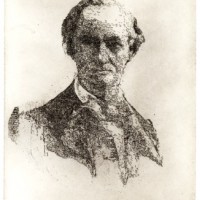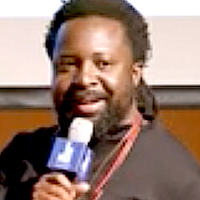While events are postponed at The Graduate Center of the City University of New York in the heart of Manhattan, videos of recent public programs from its archive will be featured here for your enjoyment. The videos offer illuminating discussions in two main categories: insights into current events and conversations with leading writers and artists.
GC CUNY Keeps the Conversation Going:
Before April Slips Away
A friend who lives deep in the French countryside was listening to the radio the other day when she heard a poem by Baudelaire, called “Avril.” She spent the entire day trying to trace it and finally emailed Radio France to ask where she could read it. The answer came. But there’s a surprising kicker.
GC CUNY Keeps the Conversation Going:
Racism and Democracy; also biographer
David Nasaw on the moguls Joseph P. Kennedy,
Andrew Carnegie, and William Randolph Hearst
While events are postponed at The Graduate Center of the City University of New York in the heart of Manhattan, videos of recent public programs from its archive will be featured here for your enjoyment. The videos offer illuminating discussions in two main categories: insights into current events and conversations with leading writers and artists.
Just an Arbitrary Notion
for a useful meaning
no starched collar
inked his lines
nor the uptight
narrowness
of the familiar
bank clerk
Coping With the Shitstorm #6
Music for a Sunday morning.
From a Diary #2
Heavy snow took down the internet, which came back up just now . . . will the power lines go down ? . . . the snow is still falling . . . fingers crossed . . . beautiful to look at though, and the two grandkids will go sledding . . . hear from a friend in Berlin that the sun is out there . . . and so are the sun worshippers . . . plenty of ambulance sirens too . . . no sun here, much less worshippers . . . as to sirens, I haven’t heard one in four weeks . . . glad of that . . . even in normal times they were a regular sound track back in the city . . .
Two Peas in a Pod
Even before President Twitter Fingers declared himself “a very stable genius,” the Idi Amin comparison was irresistible. So it’s been around for years, but it’s worth renewing.
Coping With the Shitstorm #5
David Erdos reads Poem 35—about selfishness and gaining a perspective on it in current conditions—from his forthcoming book, ‘The Corona Collection: 2020 Vision.’
GC CUNY Keeps the Conversation Going:
Workers & Wages with Paul Krugman;
Marlon James on Fantasy Fiction
Why has it been so hard for American workers to make a living? Why haven’t the economy’s gains of the recent past meant higher wages for everyone? This week, as inequality and job insecurity are intensified by the Covid-19 pandemic, take look at “Workers and Wages in America Today” for a long- term perspective. Also, for a change of pace, enjoy a great discussion with Man Booker Prize-winner Marlon James about his venture into fantasy fiction.
From a Diary . . .
I’ve been skimming through a complete collection of Chekhov’s stories. There’s lotsa chaff—small anecdotes published in newspapers from early days that don’t do much and weren’t intended for the ages. But then you come upon “an unpleasantness,” a long story from a later period that stands up like an erection. It’s about a doctor who runs […]
Coping With the Shitstorm #4
Music for a Monday morning.
GC CUNY Keeps the Conversation Going:
Economists Emmanuel Saez & Gabriel Zucman;
authors Suketu Mehta & Gary Shteyngart
Economists Emmanuel Saez and Gabriel Zucman talk about how the rich dodge taxes and how to make them pay. And authors Suketu Mehta and zary Shteyngart discuss how American culture is constantly being remade by immigrants.
Coping With the Shitstorm #3
A friend writes from the French countryside: The invisible threat casts a shadow over an otherwise idyllic springtime. When normally one’s own sorrows are cast aside, albeit temporarily, by the blossoming of nature and its infectious sense of hope, this year comes with a malaise which seems to leach all sense of renewal; and so I find myself hesitant in all I do.
Coping With the Shitstorm #2
A friend writes from Berlin: Good news … I received 5000 euros from the city. I could hardly believe it when I looked at my bank account. That will come in handy. Now we simply have to survive. It was very generous to artists who live here, many of whom are wiped out by what has happened. The decisions were made quickly, based simply upon the evidence that an artist truly has been living and working on their art here. It all seems unreal…everything does now.
GC CUNY Keeps the Conversation Going:
Milanovic, Piketty, Stiglitz, and Krugman
While events are postponed at The Graduate Center of the City University of New York in the heart of Manhattan, videos of recent public programs will be featured from its archive for your enjoyment. The videos provide illuminating discussions in two main categories: insights into current events and conversations with leading writers and artists. (Courtesy of GC CUNY’s Public Programs archive.)
Twitter Fingers Has It ‘Totally Under Control’—Oh Yeah.
As of two weeks ago, about a million people saw this. Some three hundred million more need to see it. Now he’s trying to kill ads that use his own words against him.
Virus Cooking: Some People Go Stir Crazy
Guillaume Robert goes salad crazy.














